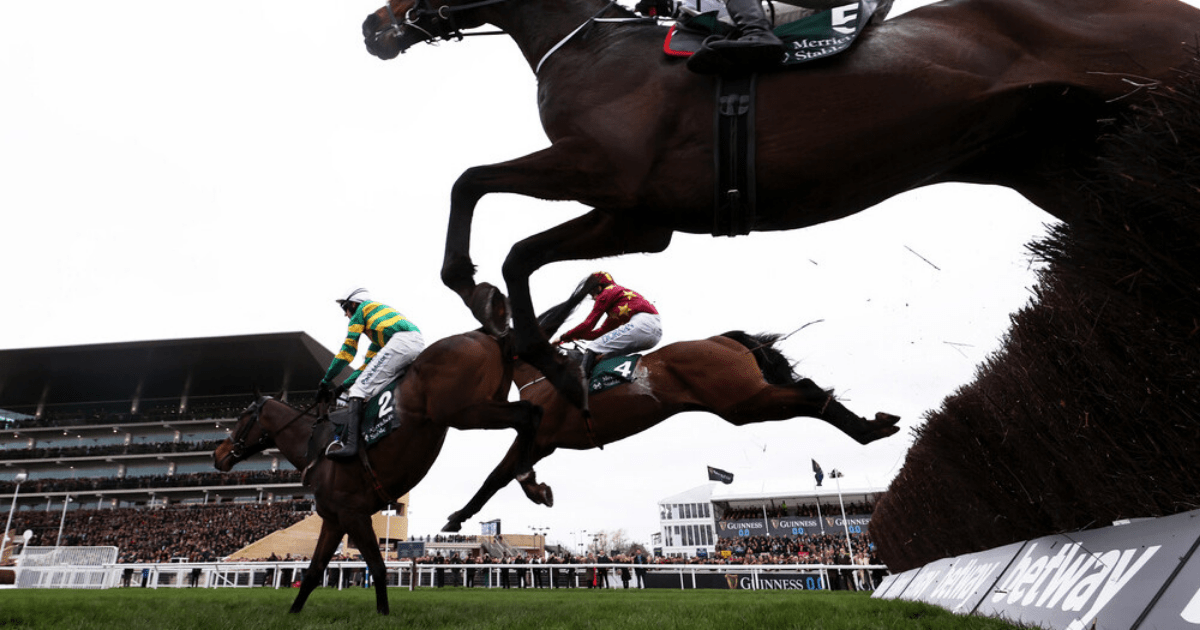The Queen Mother Champion Steeple Chase is in full swing at the Cheltenham Festival day two, and we have the results for you!
Want to know how every horse finished? Read on or head to Sun Racing's Cheltenham live blog for the latest updates.
Full Results
3.30: Queen Mother Champion Steeple Chase
Stay tuned for the full horse finishing order.

Cheltenham Day-by-Day Schedule
Champion Day – Tuesday, March 12
13:30 – Supreme Novices’ Hurdle (WINNER: SLADE STEEL)
14:10 – Arkle Challenge Trophy (WINNER: GAELIC WARRIOR)
14:50 – Handicap Steeple Chase (WINNER: CHIANTI CLASSICO)
15:30 – Champion Hurdle Challenge Trophy (WINNER: STATE MAN)
16:10 – Mares’ Hurdle (WINNER: LOSSIEMOUTH)
16:50 – Juvenile Handicap Hurdle (WINNER: LARK IN THE MORNIN)
17:30 – National Hunt Steeple Chase Challenge Cup (WINNER: CORBETTS CROSS)
Style Wednesday – Wednesday, March 13
13:30 (13:45) – Novices’ Hurdle (WINNER: BALLYBURN)
14:10 (14.30) – Novices’ Steeple Chase (WINNER: FACT TO FILE)
14:50 (15:15) – Coral Cup Hurdle (WINNER: LANGER DAN)
15:30 (16:00) – Queen Mother Champion Steeple Chase
16:10 – Cross Country Steeple Chase – CANCELLED DUE TO WEATHER
16:50 – Johnny Henderson Grand Annual Steeple Chase Challenge Cup
17:30 – Champion Bumper

CHELTENHAM FESTIVAL 2024: FOLLOW ALL THE ACTION WITH OUR LIVE BLOG
St. Patrick’s Thursday – Thursday, March 14
13:30 – Turners Novices’
14:10 – Pertemps Network Final
14:50 – Ryanair Steeple Chase
15:30 – Paddy Power Stayers’ Hurdle
16:10 – Magners Plate
16:50 – Jack de Bromhead Mares Novices’ Hurdle
17:30 – Fulke Walwyn Kim Muir Challenge Cup
Gold Cup Day – Friday, March 15
13:30 – Triumph Hurdle
14:10 – County Handicap Hurdle
14:50 – Albert Bartlett Novices’ Hurdle
15:30 – Cheltenham Gold Cup
16:10 – Festival Challenge Cup Open Hunters’ Steeple Chase
16:50 – Mares’ Steeple Chase
17:30 – Martin Pipe Conditional Jockey’s Handicap Hurdle
How to Watch Every Cheltenham Race
Cheltenham Festival kicked off on March 12, and ITV is airing five races live each day. ITV1 will broadcast the first five races of each day, with coverage from 1 pm to 4:30 pm. The final two races of each day can be watched on Racing TV. Live stream the first five races of the festival for FREE through the ITVX app/website.
Remember to Gamble Responsibly
For information on responsible gambling practices, visit here. If you need help with a gambling problem, contact the National Gambling Helpline on 0808 8020 133 or visit www.gamstop.co.uk to be excluded from all UK-regulated gambling websites.
Frequently Asked Questions
What’s the first step when training a racehorse?
The initial phase of training a racehorse involves a critical stage known as “breaking,” where the horse becomes accustomed to carrying a saddle, bridle, and the weight of a rider. During these sessions, patience is key to ensuring the horse feels comfortable around humans and with the equipment they will use throughout their racing career.
Is it necessary for a racehorse to have a specific type of shoe?
Racehorses typically wear specialized shoes called racing plates, which are lighter and thinner than regular horseshoes. These plates are designed to provide the required traction while also minimizing the weight. A farrier skilled in working with racehorses will carefully select and fit these shoes to match each horse’s hoof conformation and the specific racing surface they will be running on.
What health precautions must be taken when training racehorses?
It is important to pay close attention to the health of a racehorse in order for it not be injured or ill. It is important to have regular veterinary exams, receive vaccinations, provide dental care, and maintain proper hoof health. The horse should also be monitored for signs of discomfort, fatigue or strain. It is important to implement a carefully planned training regime that allows a gradual progression in intensity. This will minimize the risk for musculoskeletal problems.
Can you ride a racehorse in any place?
Although the horse can train on various tracks initially, specific racing training requires facilities which simulate the conditions that the horse is likely to face in competition. This means that you need to have tracks that are of the correct size, with the same kind of surface your horse will be racing. The correct track will help condition your horse and give them the experience they need in that racing environment.
How often is it recommended that racehorses are trained?
Training frequency for racehorses is usually tailored to the individual horse’s needs, level of fitness, and racing schedule. They would usually have a daily regimen consisting of walking, trotting and cantering with more intense work like galloping and breezing a few times a week in order to build speed and stamina. Rest days allow the horse time to recover from training and to avoid overtraining.
How can I prepare my horse for racing?
Conditioning a racehorse is a gradual process that includes a combination of long, slow distance work to build stamina and shorter, faster workouts to develop speed. A carefully designed regimen of exercise must gradually strengthen the horse’s cardiovascular, muscular, and skeletal system. This is done to mimic the stress of racing, without injuring or overstressing it.
Statistics
- Racehorse mortality rates during racing have been observed to be between 1.5 to 2 deaths per thousand starts, depending on the racing jurisdiction.
- An extensive survey indicated that over 90% of racehorse trainers utilize swimming as a low-impact exercise in their conditioning routines.
- Gastrointestinal issues affect up to 90% of racehorses during their training, emphasizing the need for careful dietary management.
- The average racehorse reaches its peak physical ability between the ages of four to five, with some variation based on the breed and individual development.
- Statistically, less than 1% of thoroughbred foals born each year will go on to win a stakes race.
- Approximately 70% of a racehorse’s diet consists of forage, with the remainder made up of grains and supplements to meet their high-calorie needs.
External Links
equibase.com
thoroughbred-racing.net
thoroughbredracing.com
horseracing.com
theridinginstructor.net
grayson-jockeyclub.org
How To
How To Create an Effective Training Schedule for a Racehorse
The best training schedules for racehorses should balance intense exercise with rest. You can vary the intensity of your weekly workouts to increase fitness by mixing walking, trotting or galloping with breezing. Rest days are important for mental and muscle recovery. Season training cycles with respect to the horse’s racing calendar, tapering activity before a race to ensure peak performance on race day.

